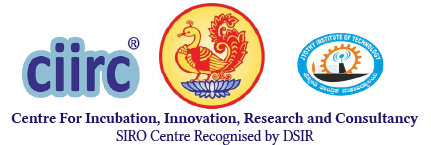Overview
Research
Focus
Select Publications
Facilities
Projects
Research Staff
Overview
Water pollution has become a monumental problem which needs immediate attention and remedial action today. Indeed the supply of clean and safe water has been a challenge; contamination of water because of hazardous heavy metal ions, pathogens and dyes has made things even worse. All of these contaminants are potent environment and health degrading elements.
Water treatment by means of technologies such as membrane separation, ion-exchange, reverse osmosis, oxidation, photocatalysis and adsorption is currently in practice. Among the existing systems of water treatment, adsorption is proposed to be the most viable approach for water treatment owing to its ease of operation, high efficacy, economical and eco-friendliness. Innumerous solid sorbents have been explored for treating heavy metals, dyes, pesticides and pathogens present in polluted water. Activated carbon made from various resources has been the primary material used for sorption of contaminants. Even though activated carbon is recognized as a universal adsorbent for treating wastewater, there are several limitations like high cost and high energy consumption. Hence, it is necessary to develop other low-cost and sustainable adsorbents.
Provision for the supply of safe drinking water in rural India, with about 1.42 million habitations and millions of water sources, is an amazing task. Due to the logistical problems and inadequate water quality testing infrastructure, generation of reliable water quality data on regular basis has been an acknowledged problem. Monitoring and surveillance of water quality on regular basis, has the objective of protecting the water sources to the greatest extent possible. When contamination occurs, effective quality testing provides early warning, which permits interventions aimed at reducing/ or eliminating undesirable constituent to the acceptable level.
Research
Focus
In order to overcome these issues research is addressed towards Development of – Low-cost & eco-friendly adsorbents by simple methods using precipitation, sol-gel and hydrothermal techniques. – Cost-effective field testing kit for the detection of key elements in drinking water. Towards exploring new low-cost and eco-friendly adsorbents, the group has developed metal oxide and their composites, graphene composites, plant protein-layer double hydroxide composites, cellulose nanocomposites, carbon spheres and activated carbon derived from various bio resources etc. Many of these nanomaterials/composites show exceptional adsorption towards metal ions, dyes and pathogens removal from contaminated water.
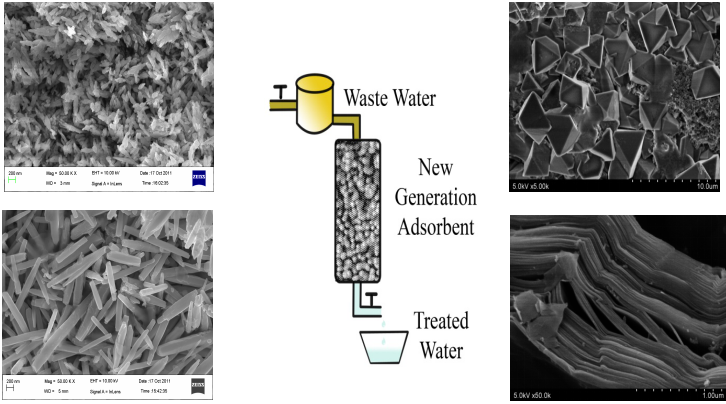
Combination of spectroscopy, electrochemistry and microscopic techniques were used to understand the material synthesis and water purification mechanism. Ultimately the gained experience is used to develop low cost community based water filters for rural households.

Typical image showing, multifunctional composite of Fe2O3 and ZnO synthesized by hydrothermal method was used for Cr(VI) removal and to study antioxidant and antibacterial properties. The composite was found to eliminate about 97% of Cr(VI) from the solution of concentration range 5-20 mg/L. Additionally, Fe2O3-ZnO composite displayed useful character of antioxidant property by inhibiting 12% of DPPH free radicals.The Fe2O3-ZnO composite killed more than 99 % of Staphylococcus aureus from water.
Furthering these ongoing studies the team is also working on the development of multiparameter water quality test kits to measure physical, chemical and microbiological contaminants in the water. This kit can be used as a standard tool to collect information from various water sources. Water quality test kits are ideal for engineers, water treatment professionals; and building services and facilities management specialists involved in water testing applications including potable water, industrial process systems, boilers and cooling systems, swimming pools, and wastewater treatment.

Products
1. Multipurpose adsorbents with exceptional adsorption capacity
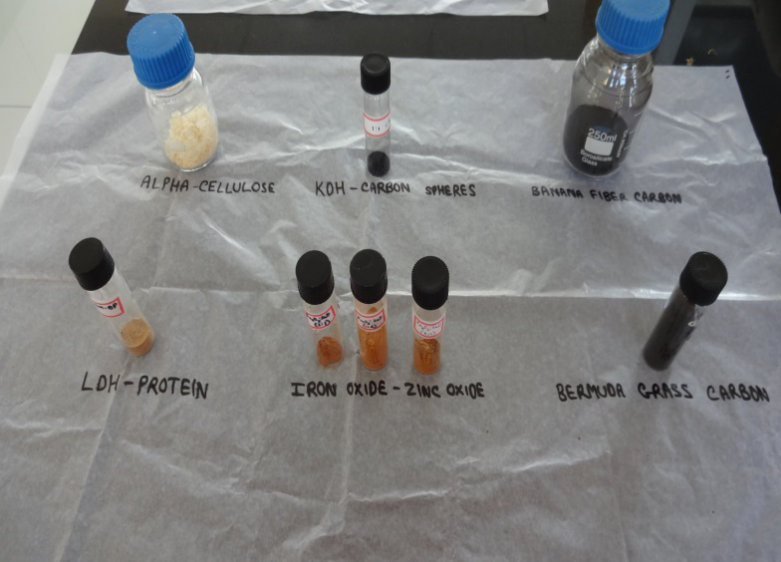
Adsorbents developed for the removal of heavy metal ions, dyes and pathogens
The developed hierarchically assembled nanostructured metal oxides, grapheme nanocomposites, polymer functionalized hydroxides, carbon sphere, open ended hollow carbon and other structured carbon based materials derived from various bio-sources have exceptional adsorption capacity and are capable of removing heavy metals and dyes including some of the pathogens from the wastewater. Many of the above materials also act as good photocatalysts for the degradation of azodyes.
2. Domestic Water Filters for Rural Community
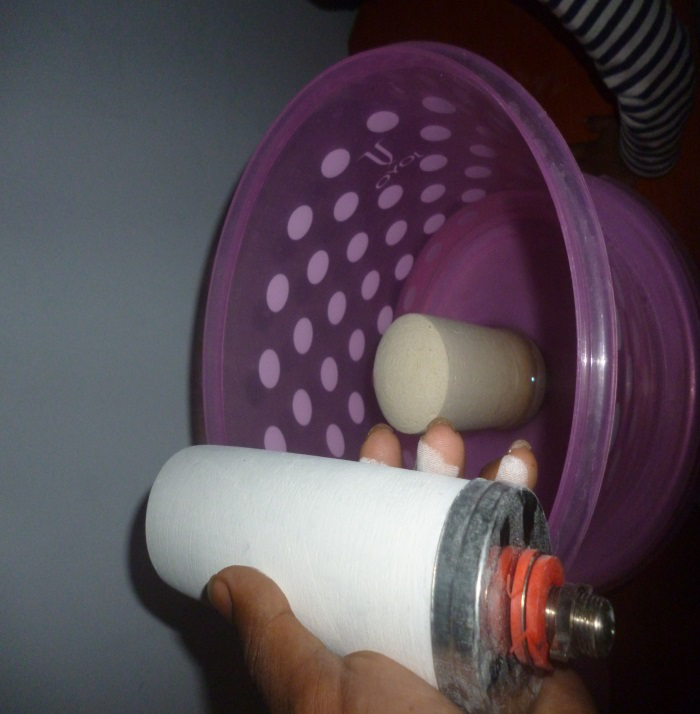
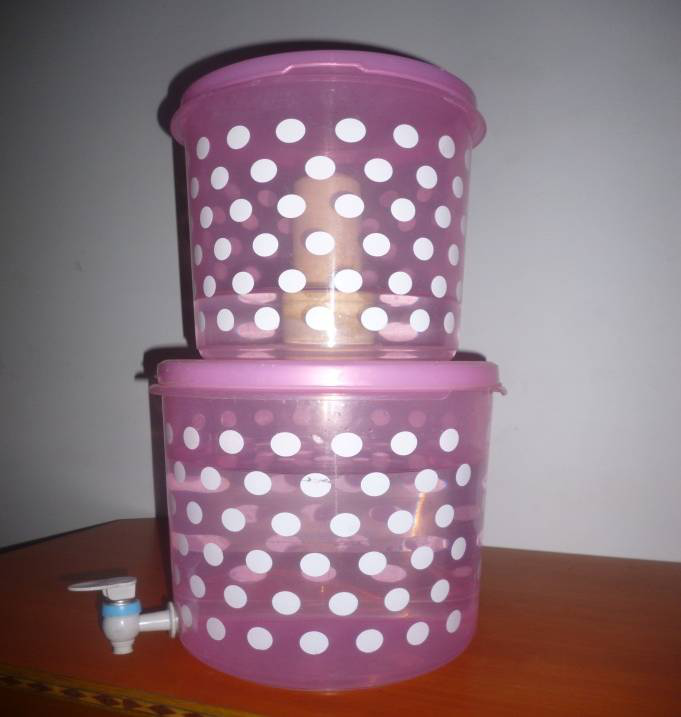
Domestic water filters
The ultimate objective of our research is to develop low-cost community based water filters for rural population using locally available cheap materials such as sand or bio-carbons. In this direction, the team has developed certain low-cost water filters such as slow sand filters, ceramic water filters and nanomaterials based gravity filters in collaboration with industries.
Select Publications
Highly Porous Carbon from a Natural Cellulose Fiber as High Efficiency Sorbent for Lead in Waste Water, H.B. Muralidhara et al., Bioresource Technology(2017) 245:296-299, IF:5.651.
Potential Applications of Cellulose and Chitosan Nanoparticles/composites in Wastewater Treatment: A Review. Sharon Olivera, Muralidhara H. B., Venkatesh K., Vijay Kumar G., Gopalakrishna K., Yogesh Kumar K. Carbohydrate Polymers (2016) 153:600–618. IF: 4.811.
Development of multipurpose CuO-Graphene oxide nanocomposites for heavy metals adsorption and super capacitor applications. Sharon Olivera, Muralidhara H. B., Archana S., Vidyasagar C.C., Yogesh Kumar K. Energy and Environment Focus (2016) 5:1-11.IF:
SnO2 nanoparticles as effective adsorbents for the removal of cadmium and lead from aqueous solution: Adsorption mechanism and Kinetic studies. Yogesh Kumar K., Vinuth Raj T.N., Archana S., Sharon Olivera, Muralidhara H.B. Journal of Water Process and Engineering (2016) 13:44–52. IF:0.913.
Magnificient adsorption capacity of hierarchical mesoporous copper oxide nanoflakes towards mercury and cadmium ions; Determination of analyte concentration by DPASV,H.B. Muralidharaet al.,Powder Technology(2014)258: 11-19. IF: 2.942.
Low Cost Synthesis of mesoporous Zn(II)−Sn(II) mixed oxide nanoparticles for the adsorption of dye and heavy metal ion from aqueous solution,H.B. Muralidhara et al.,Desalination and water treatment(2013)51: 1–15. IF: 1.18.
Low-cost synthesis of metal oxide nanoparticles and their application in adsorption of commercial dye and heavy metal ion in aqueous solution,H.B. Muralidhara et al., Powder Technology(2013) 246:125–136. IF: 2.942.
Science Direct, top 25 list of most downloaded articles ranked 16th on the top 25 for powder technology – July to September 2013.
Hierarchically assembled mesoporousZnOnanorods for the removal of lead and cadmium by using differential pulse anodic stripping voltammetric method H.B. Muralidhara et al., Powder Technology (2013) 239: 208–216. IF: 2.942.
Graphene and graphene oxide as effective adsorbents toward anionic and cationic dyesH.B. Muralidhara et al., J of Colloid and Interface Science (2011)361: 270-277. IF: 4.233.‘Top cited articlein the year 2010-11 award by ‘Journal of colloid and Interface Sciences’.
Elucidation of Cell Killing Mechanism by Comparative Analysis of Photoreactions on Different Types of Bacteria. Swetha et al., Photochemistry and Photobiology 88 (2): 414– 422. IF: 2.413
Enhanced Bactericidal Activity of Modified Titania in Sunlight against Pseudomonas aeruginosa, a Water Borne Pathogen. Swetha et al., Photochemistry and Photobiology. 86: 1127-1134. IF: 2.413
Facilities
Electrochemical work station (CH Instruments, USA), Water bath, Ultrasonic bath, Muffle Furnace, Vacuum oven, Water distillation unit, Hot air oven, Deep freezer, Fischer Centrifugation unit.
Projects
Development of Low-cost Nanomaterials for Water Purification Applications-SSPS
Development of Water Quality Test Kits for Rural Community- SSPS
Development of Domestic Water Filters for Rural Community- SSPS
Research Staff

Muralidhara completed his Master’s and Ph.D from Kuvempu University, Karnataka and joined IISc, Bangalore as a Post-doctoral fellow in the year 2008. Subsequently he got into the academic domain and worked as Head-R&D Chemistry at KSIT and Center for Emerging Technologies, Jain University, Bangalore. Muralidhara’s main research domain includes electrochemistry and water purification. Research on Electrochemistry involves the development of low-cost Iron based flow batteries for renewable storage and electrodeposition on metals/alloys or 3D plastics for aerospace, automobile, medical and engineering applications. Research on water purification includes design and characterization of hierarchical nanostructures for removal of heavy metal ions and dyes from contaminated water. He has already completed projects funded by VTU and DOS and currently has ongoing projects from DST.
Muralidhara has authored about thirty five research articles and one book. His publications have so far been cited more than 700 times and has a h-index of 8. He has supervised two Ph.Ds, and more than thirty students at the Master’s level. Apart from basic and applied research he is also associated with projects having societal relevance and industrial/consultancy projects in the area of environment and electrochemistry. Muralidhara is the recipient of “MRSI Medal” by Materials Research Society of India. He is a life member for several bodies and reviewer for reputed publishers like Elsevier, Springer and Taylor and Francis. Also he is the recipient of best oral award in conferences, top cited articles award and best reviewer award from Elsevier. He has delivered many invited/plenary lectures and is currently working as an Associate Professor.
Email Id: muralidhara.hb@ciirc.jyothyit.ac.in
 Santosh holds a Ph.D in Chemistry from National Institute of Technology Karnataka (NITK), Surathkal. During his Ph.D, he was awarded the Swedish Institute Guest Scholarship to carry out a part of his research work at Stockholm University, Sweden. He was one among the 250 people selected globally to be a part of the Nobel Prize 2009 Lectures & Award Ceremony held at Stockholm which is rarest of the rare life time opportunities. He is the only Indian till-date to be awarded the IUPAC’s Junior Researcher Award for Research Excellence in Thermodynamics (2010). He pursued his Postdoctoral Research work at the University of Wisconsin, Madison, USA. He has many international publications to his credit in journals of high repute. He has delivered several invited talks on various scientific topics & skill development programs. He has also trained many teachers & students in numerous training programs. Identifying his contributions to Science Education, he was recognized as one of the Global Shapers of Karnataka by the World Economic Forum in 2012. He was awarded the Fast Track Young Scientist project grant in 2013 by the Department of Science & Technology, Govt. of India. In 2014, he was awarded the prestigious Commonwealth Professional Fellowship – UK, Short Term Fellowship – Hungary & Summer Research Fellowship – India. Recently, he won the BIRAC-GYTI “SRISTI Award of Appreciation” in 2017 for his innovation on Rapid First Aid Solution. He was one of the 20 Young Scientists selected by the Department of Science and Technology, Govt. of India and participated in the BRICS Young Scientists Conclave – 2017 held at Hangzhou, China. He acts as a Focal Point to the European Union Funding Programs & facilitates Indian students/researchers on collaborative activities. He has successfully nurtured & facilitated several Indian students applying for various fellowships/scholarship at Foreign Universities. He also has the experience of serving as the Chief Operating Officer of an Incubation Centre supported by DST-ALSTOM. His research interests are in the areas of energy storage materials, protein folding, biomedical devices & biosensors, water & has research collaborations spanning different countries & continents. He also has the experience of executing projects being funded by various agencies such as DST, DRDO, BIRAC-CEFIPRA, DIC, and is currently working as an Associate Professor.
Santosh holds a Ph.D in Chemistry from National Institute of Technology Karnataka (NITK), Surathkal. During his Ph.D, he was awarded the Swedish Institute Guest Scholarship to carry out a part of his research work at Stockholm University, Sweden. He was one among the 250 people selected globally to be a part of the Nobel Prize 2009 Lectures & Award Ceremony held at Stockholm which is rarest of the rare life time opportunities. He is the only Indian till-date to be awarded the IUPAC’s Junior Researcher Award for Research Excellence in Thermodynamics (2010). He pursued his Postdoctoral Research work at the University of Wisconsin, Madison, USA. He has many international publications to his credit in journals of high repute. He has delivered several invited talks on various scientific topics & skill development programs. He has also trained many teachers & students in numerous training programs. Identifying his contributions to Science Education, he was recognized as one of the Global Shapers of Karnataka by the World Economic Forum in 2012. He was awarded the Fast Track Young Scientist project grant in 2013 by the Department of Science & Technology, Govt. of India. In 2014, he was awarded the prestigious Commonwealth Professional Fellowship – UK, Short Term Fellowship – Hungary & Summer Research Fellowship – India. Recently, he won the BIRAC-GYTI “SRISTI Award of Appreciation” in 2017 for his innovation on Rapid First Aid Solution. He was one of the 20 Young Scientists selected by the Department of Science and Technology, Govt. of India and participated in the BRICS Young Scientists Conclave – 2017 held at Hangzhou, China. He acts as a Focal Point to the European Union Funding Programs & facilitates Indian students/researchers on collaborative activities. He has successfully nurtured & facilitated several Indian students applying for various fellowships/scholarship at Foreign Universities. He also has the experience of serving as the Chief Operating Officer of an Incubation Centre supported by DST-ALSTOM. His research interests are in the areas of energy storage materials, protein folding, biomedical devices & biosensors, water & has research collaborations spanning different countries & continents. He also has the experience of executing projects being funded by various agencies such as DST, DRDO, BIRAC-CEFIPRA, DIC, and is currently working as an Associate Professor.
Email Id: santosh.ms@ciirc.jyothyit.ac.in
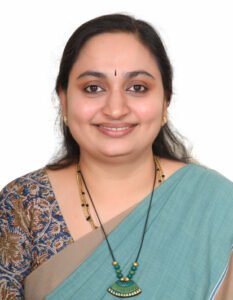 Uma Ullas is an active researcher in the field of Nano sensors and materials, with special interest in biomedical devices and IoT based sensors for water quality monitoring and graduated with a doctorate from the University of Mysore. In addition to being an Associate Professor at the centre, She also happens to be a courtesy Associate Professor at Department of Electrical and Computer Engineering at Florida International University, Miami, FL, USA. She has also taught courses at both the undergraduate and postgraduate levels Electronic Science and Nanoscience students at the prestigious MCC, Bangalore, India for nearly twenty years. Currently, she is working on fabrication of Nano sensors and wearable medical devices like electromyogram, which finds applications in diagnosis of neuromuscular disorders and sports; and Nano material conducting ink for printable electronics. Uma is actively engaged with industry as consultant for Nano sensors, and is onboard with GEMN Research & Development, a startup in biomedical devices space. She is also a co-investigator of a UGC sponsored Indo-US collaborative project on soil condition testing and monitoring. Uma has the distinction of publishing numerous papers in several international and national journals, and has been a member of Board of Studies and Board of Examiners of various institutions. She has also authored a book on Electronics for students pursuing Bachelor’s degree at Bangalore University, Bangalore, India.
Uma Ullas is an active researcher in the field of Nano sensors and materials, with special interest in biomedical devices and IoT based sensors for water quality monitoring and graduated with a doctorate from the University of Mysore. In addition to being an Associate Professor at the centre, She also happens to be a courtesy Associate Professor at Department of Electrical and Computer Engineering at Florida International University, Miami, FL, USA. She has also taught courses at both the undergraduate and postgraduate levels Electronic Science and Nanoscience students at the prestigious MCC, Bangalore, India for nearly twenty years. Currently, she is working on fabrication of Nano sensors and wearable medical devices like electromyogram, which finds applications in diagnosis of neuromuscular disorders and sports; and Nano material conducting ink for printable electronics. Uma is actively engaged with industry as consultant for Nano sensors, and is onboard with GEMN Research & Development, a startup in biomedical devices space. She is also a co-investigator of a UGC sponsored Indo-US collaborative project on soil condition testing and monitoring. Uma has the distinction of publishing numerous papers in several international and national journals, and has been a member of Board of Studies and Board of Examiners of various institutions. She has also authored a book on Electronics for students pursuing Bachelor’s degree at Bangalore University, Bangalore, India.
Email Id: umaullas@jyothyit.org
 Jagadeesh is an alumnus of the Indian Institute of Science, Bengaluru, India. He has over 30 years of Institutional & Industry experience and has been instrumental in the establishment of Product Development Centre (PDC), and Science & Technology Entrepreneurs Park (STEP), SJCE, Mysuru. During his tenure of 11 years, he has established & managed R& D Centre and Calibration Centre, and has trained a team of technicians in various electronic skills – assembly, proto-typing, testing & trouble shooting, design, calibration, etc, developed over 45 products & technologies, some of which were taken up by STEP entrepreneurs for commercialization. In addition, he has provided consultancy, design & customised testing services to local industries. He has also developed & conducted a number of Skill Development Programmes at various levels, helping bridge the gap between institutional education & practical industrial needs. Some of these programmes were custom developed for certain industry needs. He was also a faculty at BMS College of Engineering, Bangalore & Singapore Polytechnic, Singapore. Later he moved to USA & worked as a Senior Research Scientist, R&D Engineer, and Consulting Engineer at companies such as National Bio-medical Research Foundation, Snap-on Diagnostics, Brooks Automation, and others over a period of 8 years. He has served as a Research Scientist, at the Centre for Emerging Technologies and co-ordinated Internships & Projects at the industries for M.Tech Students of Jain University, as well as supports the establishment of laboratories. He is a Life member of professional bodies – Institution of Electronics & Telecommunication Engineers (MIETE), and Indian Society for Technical Education (MISTE) and served as Honorary Secretary for IETE. Jagadeesh is working as a Visiting Professor.
Jagadeesh is an alumnus of the Indian Institute of Science, Bengaluru, India. He has over 30 years of Institutional & Industry experience and has been instrumental in the establishment of Product Development Centre (PDC), and Science & Technology Entrepreneurs Park (STEP), SJCE, Mysuru. During his tenure of 11 years, he has established & managed R& D Centre and Calibration Centre, and has trained a team of technicians in various electronic skills – assembly, proto-typing, testing & trouble shooting, design, calibration, etc, developed over 45 products & technologies, some of which were taken up by STEP entrepreneurs for commercialization. In addition, he has provided consultancy, design & customised testing services to local industries. He has also developed & conducted a number of Skill Development Programmes at various levels, helping bridge the gap between institutional education & practical industrial needs. Some of these programmes were custom developed for certain industry needs. He was also a faculty at BMS College of Engineering, Bangalore & Singapore Polytechnic, Singapore. Later he moved to USA & worked as a Senior Research Scientist, R&D Engineer, and Consulting Engineer at companies such as National Bio-medical Research Foundation, Snap-on Diagnostics, Brooks Automation, and others over a period of 8 years. He has served as a Research Scientist, at the Centre for Emerging Technologies and co-ordinated Internships & Projects at the industries for M.Tech Students of Jain University, as well as supports the establishment of laboratories. He is a Life member of professional bodies – Institution of Electronics & Telecommunication Engineers (MIETE), and Indian Society for Technical Education (MISTE) and served as Honorary Secretary for IETE. Jagadeesh is working as a Visiting Professor.
Email Id: jagadeesh.bc@ciirc.jyothyit.ac.in

Swetha Seshagiri has a Masters degree in Microbiology from Government Science College, Bangalore during 2006-08 and Doctoral degree for her thesis entitled “Interactions of Piriformospora indica with Solanum melongena L.” She has eight years of research experience having worked as Researcher at the Centre for Emerging Technologies, Jain University. Swetha has worked on inactivation of water borne pathogens using nanoparticles (water disinfection) and also on antimicrobial activity of newly formulated Ayurvedic drugs. She has filed three patents, alongside twenty five publications in peer reviewed international journals and attended several national and international conferences. She has attended several entrepreneur development programmes. She has also successfully worked on projects of VTU, DST and DRDO during her research career and currently has a Early Career grant from DST. Additionally Swetha is also a certified Coffee barista and taster and works as an Assistant Professor.
Email Id: swetha.s@ciirc.jyothyit.ac.in
 Anantha M S is a Postgraduate in Chemistry from University of Mysore and is working towards his doctoral degree. His areas of research interest are detection and removal of pollutants from wastewater and development of nanostructured materials for electrochemical applications. Presently, he is working as a Research Fellow in the centre.
Anantha M S is a Postgraduate in Chemistry from University of Mysore and is working towards his doctoral degree. His areas of research interest are detection and removal of pollutants from wastewater and development of nanostructured materials for electrochemical applications. Presently, he is working as a Research Fellow in the centre.
Email Id: ananth89msc@gmail.com
